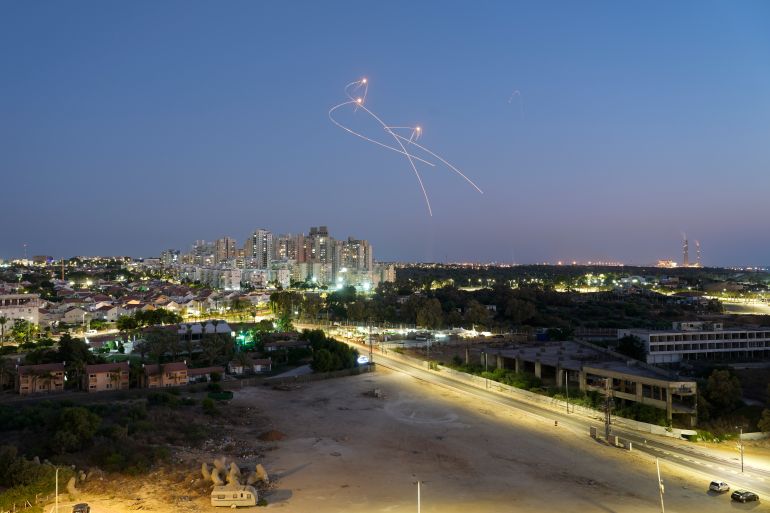What is Israel’s Iron Dome defence system and is it effective? All to know
Israel claims that the rocket-intercepting system is 90 percent effective.

United States President Joe Biden said on Tuesday that his administration had already begun sending Israel additional military assistance including interceptors to replenish the Iron Dome defence system.
For years, Israel has been heavily reliant on the Iron Dome system to detect incoming rockets in attacks by Hamas and then intercept them.
Keep reading
list of 3 itemsFirst plane carrying US ammo lands in Israel as troops mass near Gaza
How big is Israel’s military and how much funding does it get from the US?
Here’s all you know about the system and its effectiveness:
What is Israel’s Iron Dome system?
The Iron Dome is an Israeli defence system that detects an incoming rocket, determines its path, and intercepts it.
How does it work?
The system is equipped with a radar that detects an incoming rocket, its speed and its direction. The control centre then calculates whether or not the rocket poses a threat to Israeli towns.
The rockets that do not pose a threat are allowed to land in empty fields. If the rockets pose a threat, the missile firing unit launches missiles to shoot them down. The launcher contains 20 interceptor missiles.
Iron Dome was originally billed as providing city-sized coverage against rockets with ranges of between 4 and 70 km (2.5 to 43 miles), but experts say this has since been expanded.

Why was it developed?
The system was developed by Israeli defence technology company Rafael Advanced Defense Systems. The United States backed the project with a $200m grant.
The project was developed to counter rocket attacks during the war with Hezbollah in 2006. It became operational in 2011.
A naval version of the Iron Dome was deployed in 2017, to protect ships and sea-based assets.
Israel’s interception systems cost between tens of thousands and millions of dollars to shoot down rockets. The country is currently developing a laser-based system to neutralise rockets and drones at an estimated cost of $2 per interception.
Is the Iron Dome effective?
Israel claims that the Iron Dome is 90 percent effective. US Department of Defense officials have echoed this statement.
In the past, the system has successfully intercepted previous rocket attacks, according to the Modern War Institute.
However, Saturday’s surprise attack by Hamas, the kind of strike that the Iron Dome is designed to intercept, managed to overwhelm it.
This is because previously, it was a small number of rockets that were launched at Israel. Even when Hamas substantially increased the number of rocket attacks in May 2021 fighting, only 470 rockets were fired on the first day. Those were intercepted by the defence system.
![]()
The recent attack was significantly different. Hamas said it launched 5,000 rockets in an initial barrage. Israel’s military countered by saying 2,500 rockets were fired.
“That quantity was simply too much for Iron Dome to manage,” said the Modern War Institute report.
This means that the Iron Dome has an unknown saturation point. It can only intercept a certain number of rockets. If that number is exceeded, the rest of the rockets will permeate the system, according to a Forbes report from 2021.
The Iron Dome’s technical loopholes have previously been pointed out. In 2014, MIT physicist Theodore Postol told Al Jazeera that the interceptor was behaving erratically and instead of smoothly meeting the target, it was making sharp turns.
Are other countries using the Iron Dome?
The Iron Dome has gained international attention.
Rafael Advanced Defense Systems says it delivered two Iron Dome batteries to the US Army in 2020.
Ukraine is also seeking the system in its war with Russia, though Israel has so far only provided Kyiv with humanitarian support and civil defence.